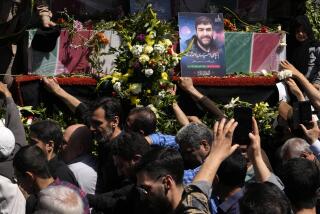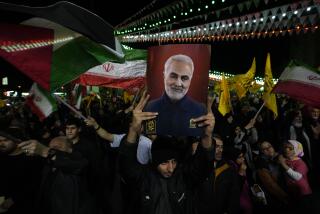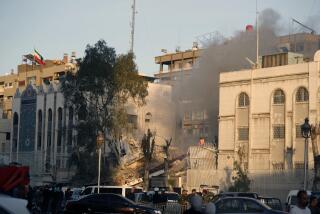Iranians protest desecration of Syrian shrine
TEHRAN -- Iranians took to the streets Friday in the latest protest against the desecration last week by Syrian rebels of an ancient Shiite shrine outside Damascus, the Syrian capital.
“We have to show our anger,” declared Ebrahim Jalili, 80, a carpet merchant who was among about 150 demonstrators marching near Tehran University after Friday prayers.
The destruction May 2 of the mausoleum of Hujr ibn Adi — a close companion of the Muslim prophet Muhammad — shocked Iran, where the population is mostly Shiite, and spotlighted the sectarian agenda of some Syrian rebel factions.
An Al Qaeda-linked Syrian rebel group, Al Nusra Front, claimed responsibility for the destruction of the mausoleum and the exhumation of the remains of the revered Shiite figure.
In a statement, Al Nusra said that its fighters ransacked the memorial because it glorified polytheism, the worship of multiple deities. The remains were dug up and buried elsewhere, the rebel group said.
Photos posted by the state-run Syrian Arab New Agency showed the gilded sides of the mausoleum collapsed on the ground and a hole in the earth where the body apparently had lain. Before the war, the shrine north of Damascus had been a popular stop for Shiite pilgrims.
Most Syrian rebels are Sunni Muslims, the largest branch of Islam. Some Sunni extremists consider Shiites to be apostates, a stance denounced by mainstream Sunni clerics.
In its statement, Al Nusra vowed “to destroy all the houses of apostasy that are spread [across] our dear Syria.”
Officials in Syria and elsewhere have voiced fears for the safety of other Shiite sites, especially the nation’s most renowned Shiite shrine, the mausoleum of Sayyida Zainab. The magnificent, golden-domed shrine, situated southeast of Damascus, is said by Shiites to be the burial place of Muhammad’s granddaughter.
Some of the protesters who rallied here Friday carried signs assailing the United States and Israel for their alleged support of militant factions in Syria. Iranian officials regularly accuse the West and Israel of fomenting sectarian strife between Muslims and inciting the war in Syria.
The Iranian government has condemned the desecration of the shrine as “a flagrant attack on all Muslims’ sanctity,” a sentiment echoed by Hezbollah, the Lebanon-based Shiite group that is a close ally of Tehran. Many Sunni clerics have also publicly deplored the attack.
Iran is a strong supporter of the government of Syrian President Bashar Assad, who is a member of the minority Alawite sect, considered an offshoot of Shiite Islam.
At Friday’s protest here, Qasem Bahmani, 50, a retired general, said he was so outraged over the violation of the shrine that he was willing to go to Syria and fight against those responsible. Tehran has denied sending troops to Syria to help Assad’s government.
Syria’s civil war has led to the destruction of many mosques and churches. Some houses of worship have reportedly been targeted, while others were struck during battles or bombardments. Each side blamed the other for the toppling last month of the landmark 11th-century minaret of the Great Umayyad Mosque in the battle-scarred northern city of Aleppo.
ALSO:
U.N. commissioner warns of possible atrocities in Qusair, Syria
Miraculous rescue lifts spirits after Bangladesh building collapse
Bombs, bullets and baby steps toward democracy in Pakistan
Special correspondent Mostaghim reported from Tehran; staff writer McDonnell reported from Beirut. Special correspondent Nabih Bulos in Beirut contributed to this report.
More to Read
Start your day right
Sign up for Essential California for news, features and recommendations from the L.A. Times and beyond in your inbox six days a week.
You may occasionally receive promotional content from the Los Angeles Times.






